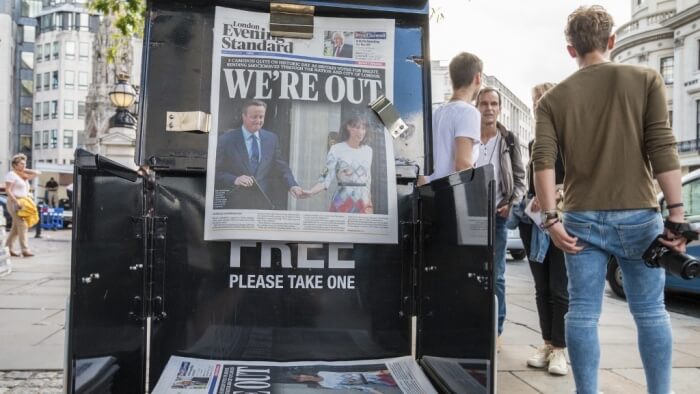Managing director of Elgood Effective Learning,
View Author Profile
Opinions
Monopoly: Why Leaders Should Play More
Leaders need to get back to playing games if they are to ride out Brexit with a solid plan

Monopoly. You either love it because you can take risks and it makes no difference to your life, or you hate it with a passion because it takes so long to play out. It’s a bit like life: Full of ups and downs, chance and luck.
For many of us, playing games as children made learning life skills fun and interesting, and it often helped us learn about ourselves, whether we realised it or not.
It’s not surprising then that playing games and imaginative play are now an important part of our early school years education curriculum. Mud kitchens are a common sight in the playground and used to help children learn about the world around them, the physics of water, to simply expanding vocabulary.
Anyone who has observed children playing will also notice that they are perfectly at ease with copying each other. It all adds to the excitement of learning and is how many of the basic building blocks of academia are cemented.
It works because it’s safe and a new experience. They can test their ideas, they can steal ideas, they can express their ideas and their world is better for it.
But as we move through education this starts to tail off and so by the time we reach working life, playing games is non-existent - unless you’re doing a day of zorbing in the name of team building.
It’s a curious situation because when you think about it playing games provides leaders with the perfect excuse to observe how people work together and how they follow or break rules. It’s also a hunting ground for ideas.
And let’s be honest, as we move towards Brexit, ideas is what we’ll need. But planning for something you haven’t experienced is hard. It plays on emotions. All the practical knowledge of how a business or a market works is undermined. It’s an uncomfortable place to be.
With Brexit we are dealing in concepts and a multitude of ‘what ifs’ hence business acumen will be challenged in a way it’s never been before. How we behave will also be tested, indeed a big question mark hangs over ethics as people face the pressure of competing in new situations and under new rules.
So if dealing with the unknown is going to need huge amounts of conceptual thinking, something that won’t come easily to a lot of people, shouldn’t we get back to creating a safe place to play with our ideas to find the way ahead?
No amount of zorbing will fix this problem it’s true, but the principle of doing an activity that’s not directly related to work has merit as it can be less threatening. It creates an environment where it’s ok to be a bit off the wall, and where everyone is in the same boat so ideas are more likely to be accepted and explored. No one is going to lose face.
It stands to reason then that playing a game based on the new Brexit world will unlock free thought and help people escape long-held and often sub-conscious assumptions that limit thinking. It opens up communication and a shared understanding of the nuts businesses need to crack and why.
That said, no business is going to work out the plan for Brexit in an afternoon, so a series of games will need to be employed, each focused on one specific challenge the business will face.
For example, most businesses are going to have a problem with skills – whether it’s to prevent vegetables rotting in the fields or to solve cancer. Movement of people, training and salaries are all part of the conundrum.
Creating a game that simulates the possibilities – changes to employment legislation, competitors’ recruitment policies, hiring budgets – is a very good way to act out the different outcomes and assess how each one would influence the plan the company adopts.
Simulations of this nature will really help tackle ambiguity head on and overcome the limitations that come from there being no precedent to draw upon. All companies face change and most large scale transformation has a reference point to mimic, but this time no one has any experience to relate to. This time we draw a blank.
Games also provide structure to the process of identifying risk and opportunity, and help people see that not everything will change, which can be comforting for those who struggle to cope with change - companies will still have a product to sell, it’s how or where they sell it that’s in review.
Most of all they test the culture of the company and how people will react and behave when faced with a new situation. Reproducing the different experiences is vital to shaping how people, and especially leaders, will respond.
We can’t forget that people have very strong views about Brexit and that might bring about loggerheads. If games help to get all of the frustration and conflict out into the open then best it is done sooner rather than later, and in a way that is managed.
Only then will people arrive at a place where they can respect their differences, yet still work together for the good of the company.
This can’t be understated. Leaders have to be in control of the plan, even if it is developed with proxy facts, and they must be ready to change the plan as new information comes to light.
Employers will look to their leaders for guidance, assurances and confirmation that there is a well thought through plan when everything around them seems so uncertain.
It’s true that none of us know what to believe – will Brexit be soft or hard? But really it doesn’t matter. We have to work with what we’ve got and right now it’s happening. Leaders all need a plan, and in the absence of facts, a game plan is the only way ahead.
Most read in Opinions
Trending articles on Opinions
Top articles on Minutehack
Thanks for signing up to Minutehack alerts.
Brilliant editorials heading your way soon.
Okay, Thanks!




